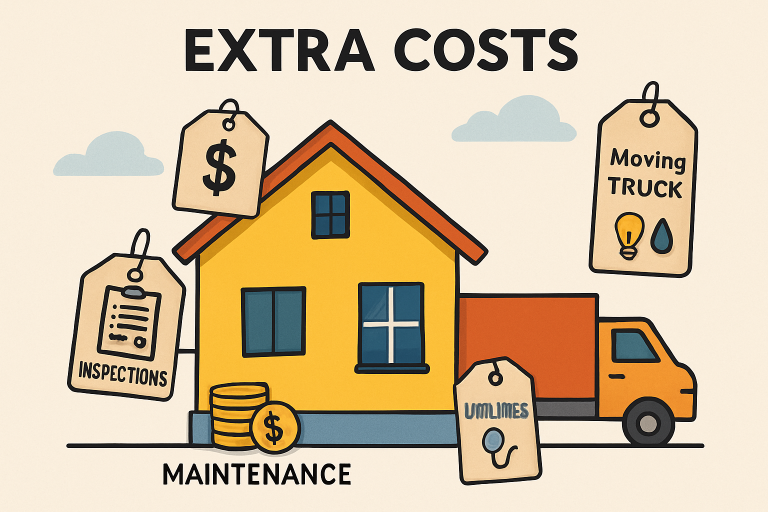Seattle’s real estate market is one of the most dynamic in the country. While the city attracts residents with its thriving job market, cultural attractions, and beautiful vistas, many buyers discover that the actual cost of owning a home extends well beyond the property’s purchase price. Between taxes, fees, maintenance, and unexpected repairs, the total investment can be much greater than anticipated. Relying on the expertise of local professionals, like Mara Haveson, can provide valuable insights to help you successfully navigate the process and avoid unpleasant surprises. Understanding unanticipated costs of homeownership is crucial to avoid stress and ensure enjoyment of a new property. Seattle’s varied neighborhoods contribute to these additional expenses, including closing costs and utility bills. Being aware of hidden costs helps protect finances and enables informed decision-making. Newcomers to Seattle may encounter unexpected challenges, such as rising property taxes and Homeowners Association dues. Researching and consulting local experts can help mitigate unexpected financial burdens.
Table of Contents
Closing Costs
Closing costs in Seattle typically range from 2% to 5% of the home’s final sale price. These fees are not optional and include loan origination charges, title insurance, escrow fees, appraisal fees, and recording costs—expenses that many first-time buyers overlook. For example, a home purchased for $800,000 could result in closing costs ranging from $16,000 to $40,000. Budgeting for these costs upfront helps ensure you are financially prepared on closing day and helps avoid last-minute borrowing or dipping into emergency savings.
Home Inspections
Conducting a thorough home inspection is standard practice in the Seattle market. It is essential for identifying potential problems, especially with older homes that are prevalent in the city’s historic neighborhoods. Typical costs for a standard inspection range from $400 to $800, depending on the property’s size and age. However, specialized inspections, such as sewer scopes or pest evaluations—which are common in this region—can add several hundred dollars to your expenses, but may save significant repair costs down the road.
Property Taxes and Homeowners Insurance
Washington State’s strong economy and rising home values translate into increasingly higher property tax bills for Seattle homeowners. The city’s property tax rate often fluctuates each year in response to school levies and public transportation improvements. Homeowners should research their prospective neighborhood’s rates and ask for recent bills during due diligence. Homeowners insurance, meanwhile, can be costly due to the city’s climate risks, such as storms or flooding, and the high value of homes in the area. Factoring both annual taxes and insurance premiums into your estimated monthly payment is necessary to avoid being blindsided by these recurring costs later.
Homeowners Association (HOA) Fees
Many neighborhoods and condominiums in Seattle require residents to pay HOA fees—monthly or annual charges that cover shared amenities, exterior maintenance, landscaping, and community reserves. HOA dues in the city average several hundred dollars per month, with some high-rise condos or new developments levying higher fees for more comprehensive services. Fees can increase or be supplemented by special assessments for major repairs or improvements, so constantly review recent meeting minutes and budgets, and discuss with your real estate agent to fully understand your obligations before purchasing.
Maintenance and Repairs
Annual maintenance and repair expenses are an unavoidable aspect of homeownership, especially in Seattle’s damp and unpredictable climate. On average, Seattle homeowners spend approximately $21,000 per year on routine maintenance, including landscaping, gutter cleaning, appliance repairs, and other related expenses. Skimping on proactive maintenance can result in even higher costs down the line, making it vital to build an annual reserve fund for both ongoing and unexpected repairs. Resources like HouseLogic offer comprehensive checklists and cost estimators to aid in planning.

Utilities and Services
Utility costs—encompassing electricity, water, trash, recycling, heating, and sometimes sewer—can vary significantly depending on the home’s size, energy efficiency, and the age of its systems. Older Seattle homes may have original fixtures or inefficient insulation, which can result in higher monthly bills. Additionally, internet and cable (often essential for remote work or entertainment) can significantly add to your budget, so obtaining cost estimates for any property under consideration is wise.
Moving Expenses
Relocating to a new home brings its own set of costs. In Seattle, local moves generally cost between $1,000 and $3,000, depending on distance, services used, and the size of your household. Movers, rental trucks, and packing materials should all be included in your moving budget. Those coming from out of state or with large families should expect higher costs and should shop around for reputable moving companies well in advance of their move-in date.
Emergency Fund for Unexpected Costs
Unexpected events are an inevitable part of homeownership: sudden appliance failures, emergency plumbing repairs, or spikes in property taxes can disrupt even the most carefully planned budgets. Establishing an emergency fund—ideally with enough to cover three to six months of living expenses—provides a safety net should the unforeseen occur. This fund not only ensures prompt responses to urgent issues but also protects you from accruing debt or financial hardship after a costly surprise.
Conclusion
Buying a home in Seattle is both an exciting milestone and a complex financial undertaking. The hidden costs, from escrow fees to unexpected repairs, should factor heavily into your decision-making process. By thoroughly researching each stage of the transaction, consulting with local real estate professionals, and planning for both recurring and unexpected expenses, you can embrace homeownership with confidence and peace of mind.
